It’s easy to miss changes in your betta’s appearance, especially if you are a new fishkeeper.
But something as simple as a cloudy look in your betta’s eyes may indicate a severe health problem.
Environmental stressors and infections make betta fish eyes cloudy. Left untreated, the problem may worsen and permanently damage your pet’s sight.
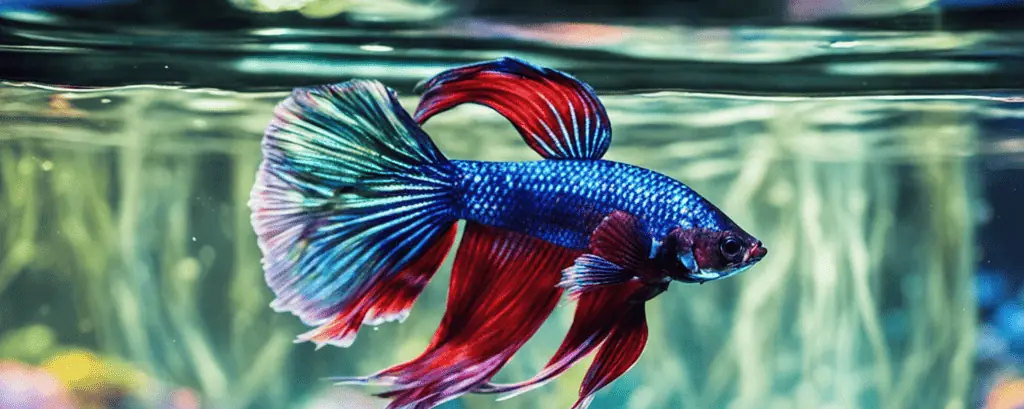
Table of Contents
Causes of Cloudy Eyes in Betta Fish

Before even attempting to treat the disorder, you need to pinpoint the cause.
Sometimes cloudy eyes are a symptom of a bigger problem. Bacterial infections, for example, could affect your betta’s eyes.
Conversely, cloudy eye is a disease in and of itself. Your betta could develop this for any of the following reasons:
- Eye infection
- Eye disease
- Popeye
- Eye injury
- Poor water quality
- Nutritional deficiency
- Genetics
Disease, Injury, and Infection

You may find the only presenting symptom is a cloudy appearance in their eyes.
In this case, your betta is probably not suffering from a more widespread disease.
Cancers, parasites, and most bacterial and fungal infections cause various symptoms.
Most of the time, a betta who is sick becomes lethargic and has trouble swimming. Appetite changes are also widespread.
On the contrary, a betta with an injured eye might only have a cloudy appearance to their eyes.
Unfortunately, any type of open wound is vulnerable to bacterial, fungal, and parasitic infections.
This is why you need to monitor your betta for signs of illness.
Even if they seem to only have problems with their eyes at first, the illness could progress.
The good news is most kinds of infections are resolved with over-the-counter antibiotic treatments.
Just be sure to understand what kind of infection you’re dealing with.
Anti-fungal and antibacterial medications are most effective if you choose the correct one.
Popeye
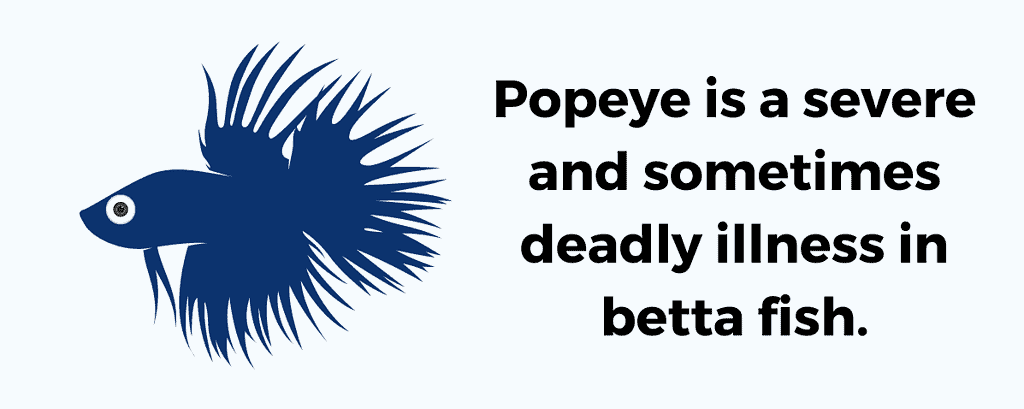
Popeye is a severe and sometimes deadly illness in betta fish. Fortunately, it is not an especially common illness.
The characteristic symptom of Popeye is an eye protruding from the head. Your betta’s eye(s) would be very swollen and irritated.
Cloudiness is among the common symptoms of Popeye.
Still, your betta does not have Popeye unless they show some of the more serious symptoms as well.
Water Conditions

We talk a lot about ammonia levels in the aquarium and why keeping them down is important.
But ammonia is not the only dangerous chemical in your betta’s tank.
Nitrite poisoning is a problem if water quality dives. (Pun intended.)
As a reminder, the goal is to keep ammonia, nitrate, and nitrite levels as low as possible.
Ammonia and nitrite should be kept at 0 ppm.
A slightly higher 20ppm nitrate level is unlikely to severely damage your fish.
The goal at all times is to keep these levels nice and low.
Prolonged exposure to these chemicals can do permanent damage to your betta. They may struggle with blurry vision for the rest of their life.
Furthermore, they could experience body rot or long-term damage to their entire body.
Overall poor water quality shortens the lifespan of betta fish.
Poor Diet

Betta fish thrive on a high-protein diet. But they need fiber as well to reduce the risk of bloat.
If your betta does not get enough protein or fiber, they are much more vulnerable to illness.
Quality food makes them stronger and healthier and builds their immune system.
Genetics
It is highly uncommon, but betta fish are occasionally born with cataracts.
If this is the case for your betta, you probably already know. They would have cloudy eyes their entire life.
Symptoms of Cloudy Eyes in Betta Fish
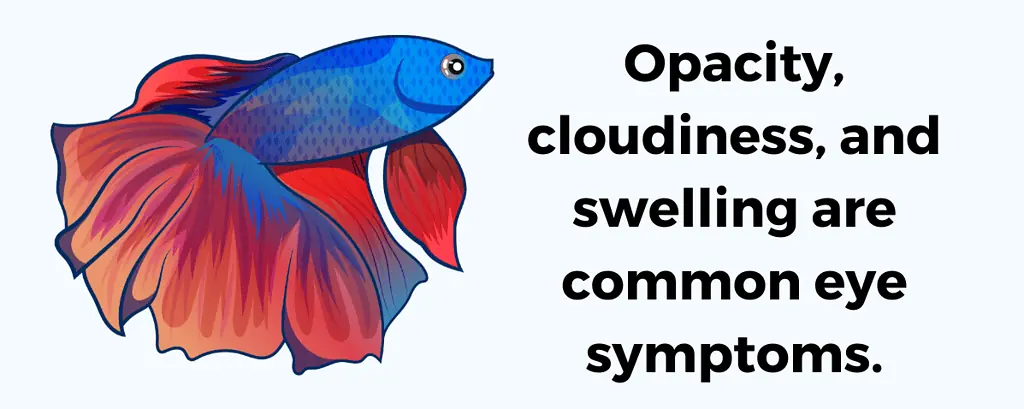
Your betta’s exact symptoms will depend on what caused their eye issues.
Here is a general list of possible symptoms:
- Opacity in the eyes
- Cloudiness in the eyes
- Swollen eyes
- Discharge from the eyes
- Loss of appetite
- Lethargy
Many of these symptoms occur together even without underlying disease.
But it’s also possible you would see just a couple of symptoms.
In the case of poor water quality, the problem could start with just a cloudy eye.
Without regular water changes, you might start seeing discharge and swelling.
Left untreated, appetite changes and trouble swimming would be next.
Most of the time, cloudy eyes are a problem with either physical trauma or water quality.
But if the cause is a disease, here are some other symptoms you might witness:
- White/cottony sores
- Discolored fins
- Brown gills
- Frayed/ragged fins
- Excess mucus on the skin
- Swollen lips
- Bleeding/inflamed fins
These are symptoms of various infections and diseases.
If you see these signs, the odds are good your betta has a more serious condition. Treat them accordingly.
Diagnosis and Treatment of Cloudy Eyes in Betta Fish

Cloudy eyes are pretty easy to diagnose in betta fish. After all, one look at your betta’s eyes will tell you whether there is a problem or not.
The trickier part is diagnosing the underlying problem.
Use our symptom lists above as a general guide. But if you are unsure, consult a veterinarian or another trusted expert.
It’s so important to get the diagnosis correct!
If you treat your betta with an antifungal medication but they really just have an injury, they probably won’t feel any better.
Because there are so many possible causes of cloudy eyes, there are many treatment options as well.
These include:
- Quarantine
- Antibiotics
- Aquarium salt
- Epsom salt baths
- Copper sulfate
- Hydrogen peroxide
- Medicated food
Quarantine Tanks
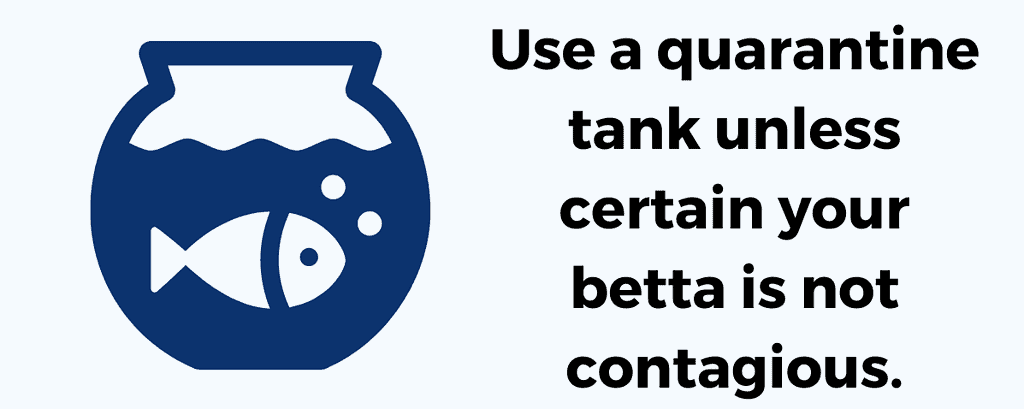
We urge you to use a quarantine tank unless you are certain your betta is not contagious.
Even if the cloudy eyes started with an injury, there is always the possibility of infection setting in.
Most infections are contagious and put the other fish in the aquarium at risk.
When you set up the hospital tank, include plants and a good filtration system.
The water conditions need to be stable to encourage a quick recovery.
If your betta is struggling with an infection or disease, you must take this chance to clean the old tank.
Be very thorough and use a sanitizing solution. Some people use vinegar, and others prefer to use a bleach solution.
Both are safe if done correctly.
Pros and Cons of Different Treatments
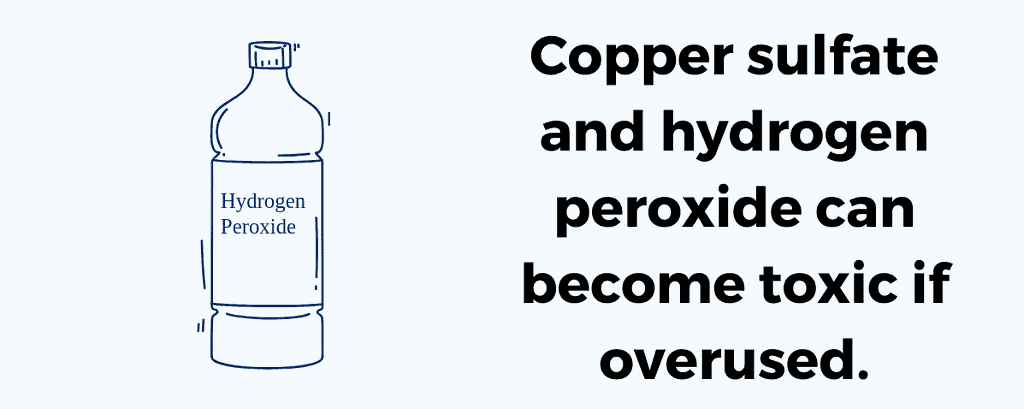
Obviously, we use a different treatment method depending on the cause of your betta’s eye problems.
But there are certain solutions we generally consider safer than others.
For example, we generally recommend against using copper sulfate or hydrogen peroxide.
They are safe and effective at low doses. But they become toxic if you use too much.
For infections, we recommend using antifungal or antibacterial medications. Here are the go-to antibiotic treatments known as Melafix and Pimafix.
Aquarium salt is a great way to treat some diseases, but it must be used carefully.
If you want to give this a go, read more about how to safely use aquarium salt first.
One more note: If your betta was injured somehow, you need to figure out what they were hurt on. Maybe there’s a piece of decor you want to take out of the tank!
Follow-Up Care
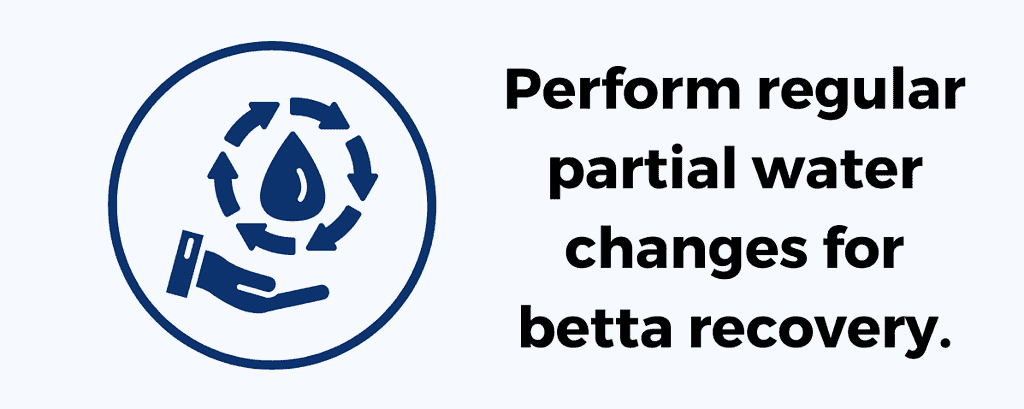
No matter what caused your betta’s cloudy eyes, caring for them as they recover is crucial.
Perform regular partial water changes, treat the water with a good conditioner, and stabilize those water parameters.
We recommend using some immune-boosting food or medicated water conditioner to support your betta.
This will prevent them from getting sick again while their body is still vulnerable.
Prevention of Cloudy Eyes in Betta Fish
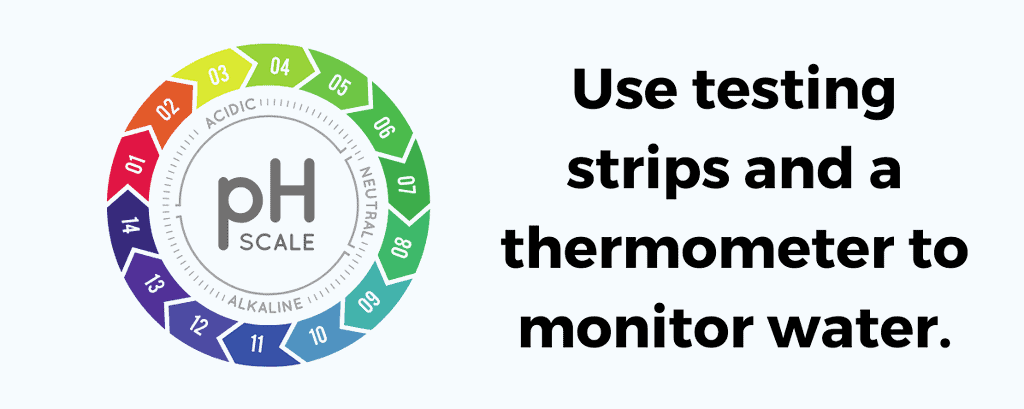
Preventing cloudy eyes in your betta may be as simple as doing a better job with water changes.
Be consistent in the way you care for your fish. Those weekly water changes aren’t optional!
Get some water testing strips and keep a thermometer attached to the tank. These tools will help you monitor water conditions.
It’s best to catch changes early, so they don’t spiral out of control.
It may also be time to adjust your betta’s diet.
Add some live and freeze-dried foods to your betta’s regimen if you feed mostly pellets. The extra protein is great for their strength!
Make a habit of checking up on your betta.
As cute as it sounds, I’m not asking you to pull out a stethoscope and give them a check-up.
Just examine them every so often and keep an eye on their behavior. Knowing your fish well enough makes it easy to see when they start to feel unwell.
FAQ about Betta Fish Cloudy Eyes

Are Cloudy Eyes A Serious Issue that Could Lead to The Death of Your Betta Fish?
Cloudy eyes are a serious but common issue for betta fish. They are often a warning sign of a bigger problem.
Sometimes the disease causing the cloudy eyes will lead to death without treatment. Fortunately, almost all these diseases are very treatable.
Are Cloudy Eyes Contagious And Can It Spread To Other Fish In The Tank?
Cloudy eyes are not contagious. But sometimes, cloudiness is caused by an infection. Parasitic, fungal, and bacterial infections are contagious.
We recommend a quarantine tank unless you’re positive the root cause is not a contagious disease.
Will cloudy eyes affect the betta fish’s ability to see or navigate?
Cloudy eyes are usually visible signs telling us the betta is having trouble with cloudy vision. It’s impossible to know exactly how bad their blurred vision is.
Some may be able to continue navigating and eating as usual. Others may struggle to see their food and spend smaller amounts of time swimming. You might even see them bump into aquarium plants and decor.
Will cloudy eyes go away on its own, or does it require treatment?

Cloudy eyes almost always require treatment. Even if your betta does not need an antibacterial or antifungal medication, they need some sort of help.
For some, this means performing more frequent water changes. This would help reduce the reaction to chemical nasties in the tank.
Is there any way to tell if an infection or injury causes a betta fish’s cloudy eyes?
Infection tends to cause a wider array of symptoms. An injury would most likely affect only one eye, not the entire body.
With an injury, you would most likely see some inflammation and redness on top of the cloudy appearance. In the case of an infection, your betta would likely have white or brown sores of some kind.
How long does it take for betta cloudy eyes to clear up?
It may take only a day or two for your betta’s eyes to clear up. This is dependent on what caused the problem. If the problem is water quality, your betta should heal when you get the water clean again.
Then again, a viral infection or another kind of illness takes longer to heal. With the use of antibiotic treatment, they should heal over the course of a few days. Without treatment, your betta’s sight will only worsen.
Are there any specific dietary changes or supplements to help clear up betta fish cloudy eyes?
Feeding a proper diet is helpful in and of itself. Getting lots of live food with good protein content is crucial. But a complete diet includes some fiber as well.
Once your betta is sick, a balanced diet still helps them fight off the disease. If you want something more for them, feed them an immune-boosting commercial food like this one on Amazon.
While it isn’t medicated, it does include vitamins to help your betta’s immune system so it can recover.
Cloudy with a Chance of Betta
Sometimes cloudy eyes in betta fish are an isolated problem. But they could indicate a much bigger problem like some infection or internal issue.
It’s imperative to act quickly when you notice eye issues in your betta.
By catching and treating cloudy eyes early, you help your fish usurp the possibility of long-term damage.
If you’re still unsure what’s causing cloudy eyes in your fish, read more on betta diseases here.


